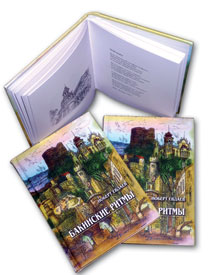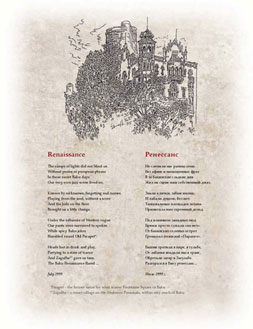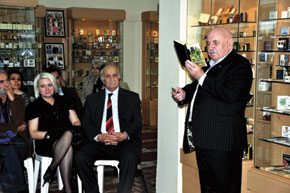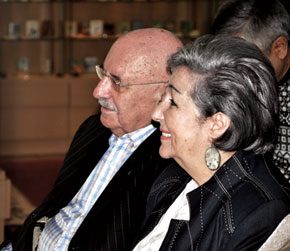Pages 36-41
by Ian peart
Conducting an interview with Nobert Yevdayev is a fascinatingly daunting pleasure. Knowing where to start in writing about him is rather like the child sitting on the floor surrounded by brightly wrapped packages and wondering which one to open first.
Baku-born in 1929, of Mountain Jewish origin, he has had 81 years of life to fill: language teacher, jazz musician, engineer, journalist, technical writer, artist (painter), trader, scriptwriter, events promoter, newspaper editor, art historian and author. And the cup runneth over still; Mr Yevdayev returned to his home town in late November with Bakinskie Ritmi (Rhythms of Baku), his collection of poems... On 1 December he was at the Miniature Books Museum in the Old City to present a full-size, as well as miniature, edition of the book, which is finely produced in hardback and illustrated by Ismayil Mammadov. The book is published by New Frontier, a company established by....Nobert Yevdayev.
As he related the twists and turns his life had taken, Nobert muellim continually referred back to Baku as the origin of many of his later interests and involvements. His origins were suitably dramatic and, according to Azerbaijani custom, auspicious. His father and aunt collected the newly-born Nobert and his mother from hospital. The phaeton taking them home collided with a man carrying the products of a nearby ceramics factory - no injuries, but the plates were smashed; “He will be a lucky man”, said his aunt.
Baku’s reach
Having graduated from the Foreign Languages Institute, Yevdayev’s first job was to teach English at a school in Kubinka, an area of Baku which had a certain reputation. On his first day, he turned to the blackboard and, just to confirm that the reputation was justified, he was hit on the back of the head by a catapulted projectile. 60 years pass and a request comes in to the New York-based monthly newspaper Noviy Rubezh (New Frontier) from a journalist wishing to submit an article. The editor agreed to meet the writer.
“Are you Nobert Yevdayev, who used to teach in school 174 in Baku?”
“Yes, I am”
“I was the one who hit you on the head with my catapult. I have looked for you ever since to apologise. I am sorry.” Forgiveness and fruitful cooperation followed. Stories like this flit in and out of the conversation as Nobert muellim relates his life. Communication is obviously important to him and also developed during his early years in Baku. He was not just a teacher; he wrote articles – on construction and social activities! - for the newspaper Molodyozh Azerbaydzhana (Youth of Azerbaijan).
Another ‘flit back’ led to more interesting connections. The young Yevdayev played piano and accordion in a jazz band. He also witnessed performances by the brilliant clarinettist and saxophonist Parviz (‘Perig’) Rustambeyov.
“Baku jazz was better than anywhere else in the USSR”....
‘Perig’ was a much lauded but incautious young jazzman and made the mistake of being too enthusiastic about the origins of his music.
“He was in love with American jazz. Once he went to the American embassy in Moscow to talk about jazz. He stayed the night there. Back in Baku, when he was playing one night at the Railway station, he was arrested....
” Parviz Rustambeyov died in the dungeons of the KGB in 1949, aged 27. Somehow, it was still possible to play and enjoy jazz – as Nobert muellim relates in a poem from his anthology, Renessans (Renaissance, at the end of this article).
 Rhythms of Baku, Nobert Yevdayev’s book of poetry, illustrated by Ismayil Mammadov, published in Israel
Rhythms of Baku, Nobert Yevdayev’s book of poetry, illustrated by Ismayil Mammadov, published in Israel
In Russia with love
On holiday in Leningrad (now St Petersburg), the 27 year old Yevdayev met Nelli, an intern from the Chemical Institute there and they soon realised they were meant to be together. They have celebrated 54 years of marriage.
Moving to Moscow, he found work with the construction company responsible for electricity, radio and phone installations to newly-built housing. He rose to become a departmental head, but the crucial factor was his knowledge of English, which led to contacts with foreign companies at exhibitions; he began writing technical literature for them and his horizons broadened.
In the 1980s his married daughter emigrated to the USA; the grandparents could not live without their grandchildren and followed in 1989, settling in Brooklyn, New York.
Nobert muellim returned to yet another activity that had begun in Baku and continued in Moscow, where he had been a member of the Union of Graphic Artists. He was, he says, one of the ‘underground painters’, that is, he did not paint in the officially approved formal style. Eventually his return to the canvas led to a book on the Ukrainian futurist painter David Burliuk (2002) and, later, to a meeting with Baku artist Ismayil Mammadov and the organisation of an exhibition of works by members of the Azerbaijani diaspora (including Yevdayev) in 2009 – that’s another branch of the story.
There is an active social scene within the diasporas of New York,
“There is a Mountain Jewish community of 20,000 in New York.....I am a member of both the Jewish and the Azerbaijani diasporas”
Thus explaining his chairmanship of the Azerbaijani Fellow Countrymen Culture Foundation in the United States and the establishment in 2003 of the Noviy Rubezh newspaper already referred to, of which he is editor-in-chief.
New York, New Frontier
The newspaper was started by the Azerbaijani Mountain Jewish diaspora and covers events in the USA, Azerbaijan and Israel. It is written mainly in the Russian language with occasional contributions in other languages, including English, and it has a website http://www.newfront.us . It covers a wide range of events, but its editor confesses that his main personal interest is cultural.
“I am not a political person.... I promote Azerbaijani culture. People should understand the culture that is possessed by Azerbaijan. A newspaper has to be involved in politics, so we turn to qualified political writers.... we write that 20 percent of Azerbaijan is occupied and this has to be resolved. The Armenian leaders are blocked by people abroad who won’t let them solve the problem in ways beneficial to both sides.”
Apart from writing books of art criticism, apart from painting and editing a newspaper, apart from his music and chairmanship of a diaspora society, what does the octogenarian do with all the spare time he must have? Well, he helps to organise social and cultural events, especially Azerbaijan’s Republic Day (28 May) and World Azerbaijanis’ Solidarity Day (31 December) and inter-religion events. The diaspora have also enjoyed a jazz festival dedicated to the memory of Vagif Mustafazade in 2005, a memorial concert to the classical composer Gara Garayev on 5th Avenue, including a performance by pianist Kamilla Mammadova. In November this year, there was a premiere showing of Oscar winning director Rustam Ibrahimbekov’s film, ‘Through the Eyes of a Ghost’. Spare time? Oh yes....
....There is, of course, the book of poems, Bakinskie Ritmi. It serves as an example of the cooperation possible between people from Jewish and Islamic cultures (the book is illustrated by Ismayil Mammadov). As the title suggests it is a look back to the place where the rhythm of the heart began – a cosmopolitan place which took in people of different creeds and cultures. Into this Islamic, eastern culture a Mountain Jewish family gave birth to a boy who would play western jazz but paint eastern musicians in a style influenced by western artists; a boy who would venture north then west, while retaining roots firmly entrenched in the sounds and sights of his native east. Let us attempt a translation of one example of the life and skills of this modern Renaissance man, Nobert Yevdayev.
by Ian peart
Conducting an interview with Nobert Yevdayev is a fascinatingly daunting pleasure. Knowing where to start in writing about him is rather like the child sitting on the floor surrounded by brightly wrapped packages and wondering which one to open first.
Baku-born in 1929, of Mountain Jewish origin, he has had 81 years of life to fill: language teacher, jazz musician, engineer, journalist, technical writer, artist (painter), trader, scriptwriter, events promoter, newspaper editor, art historian and author. And the cup runneth over still; Mr Yevdayev returned to his home town in late November with Bakinskie Ritmi (Rhythms of Baku), his collection of poems... On 1 December he was at the Miniature Books Museum in the Old City to present a full-size, as well as miniature, edition of the book, which is finely produced in hardback and illustrated by Ismayil Mammadov. The book is published by New Frontier, a company established by....Nobert Yevdayev.
As he related the twists and turns his life had taken, Nobert muellim continually referred back to Baku as the origin of many of his later interests and involvements. His origins were suitably dramatic and, according to Azerbaijani custom, auspicious. His father and aunt collected the newly-born Nobert and his mother from hospital. The phaeton taking them home collided with a man carrying the products of a nearby ceramics factory - no injuries, but the plates were smashed; “He will be a lucky man”, said his aunt.
Baku’s reach
Having graduated from the Foreign Languages Institute, Yevdayev’s first job was to teach English at a school in Kubinka, an area of Baku which had a certain reputation. On his first day, he turned to the blackboard and, just to confirm that the reputation was justified, he was hit on the back of the head by a catapulted projectile. 60 years pass and a request comes in to the New York-based monthly newspaper Noviy Rubezh (New Frontier) from a journalist wishing to submit an article. The editor agreed to meet the writer.
“Are you Nobert Yevdayev, who used to teach in school 174 in Baku?”
“Yes, I am”
“I was the one who hit you on the head with my catapult. I have looked for you ever since to apologise. I am sorry.” Forgiveness and fruitful cooperation followed. Stories like this flit in and out of the conversation as Nobert muellim relates his life. Communication is obviously important to him and also developed during his early years in Baku. He was not just a teacher; he wrote articles – on construction and social activities! - for the newspaper Molodyozh Azerbaydzhana (Youth of Azerbaijan).
Another ‘flit back’ led to more interesting connections. The young Yevdayev played piano and accordion in a jazz band. He also witnessed performances by the brilliant clarinettist and saxophonist Parviz (‘Perig’) Rustambeyov.
“Baku jazz was better than anywhere else in the USSR”....
‘Perig’ was a much lauded but incautious young jazzman and made the mistake of being too enthusiastic about the origins of his music.
“He was in love with American jazz. Once he went to the American embassy in Moscow to talk about jazz. He stayed the night there. Back in Baku, when he was playing one night at the Railway station, he was arrested....
” Parviz Rustambeyov died in the dungeons of the KGB in 1949, aged 27. Somehow, it was still possible to play and enjoy jazz – as Nobert muellim relates in a poem from his anthology, Renessans (Renaissance, at the end of this article).
 Rhythms of Baku, Nobert Yevdayev’s book of poetry, illustrated by Ismayil Mammadov, published in Israel
Rhythms of Baku, Nobert Yevdayev’s book of poetry, illustrated by Ismayil Mammadov, published in Israel In Russia with love
On holiday in Leningrad (now St Petersburg), the 27 year old Yevdayev met Nelli, an intern from the Chemical Institute there and they soon realised they were meant to be together. They have celebrated 54 years of marriage.
Moving to Moscow, he found work with the construction company responsible for electricity, radio and phone installations to newly-built housing. He rose to become a departmental head, but the crucial factor was his knowledge of English, which led to contacts with foreign companies at exhibitions; he began writing technical literature for them and his horizons broadened.
In the 1980s his married daughter emigrated to the USA; the grandparents could not live without their grandchildren and followed in 1989, settling in Brooklyn, New York.
Nobert muellim returned to yet another activity that had begun in Baku and continued in Moscow, where he had been a member of the Union of Graphic Artists. He was, he says, one of the ‘underground painters’, that is, he did not paint in the officially approved formal style. Eventually his return to the canvas led to a book on the Ukrainian futurist painter David Burliuk (2002) and, later, to a meeting with Baku artist Ismayil Mammadov and the organisation of an exhibition of works by members of the Azerbaijani diaspora (including Yevdayev) in 2009 – that’s another branch of the story.
There is an active social scene within the diasporas of New York,
“There is a Mountain Jewish community of 20,000 in New York.....I am a member of both the Jewish and the Azerbaijani diasporas”
Thus explaining his chairmanship of the Azerbaijani Fellow Countrymen Culture Foundation in the United States and the establishment in 2003 of the Noviy Rubezh newspaper already referred to, of which he is editor-in-chief.
New York, New Frontier
The newspaper was started by the Azerbaijani Mountain Jewish diaspora and covers events in the USA, Azerbaijan and Israel. It is written mainly in the Russian language with occasional contributions in other languages, including English, and it has a website http://www.newfront.us . It covers a wide range of events, but its editor confesses that his main personal interest is cultural.
“I am not a political person.... I promote Azerbaijani culture. People should understand the culture that is possessed by Azerbaijan. A newspaper has to be involved in politics, so we turn to qualified political writers.... we write that 20 percent of Azerbaijan is occupied and this has to be resolved. The Armenian leaders are blocked by people abroad who won’t let them solve the problem in ways beneficial to both sides.”
Apart from writing books of art criticism, apart from painting and editing a newspaper, apart from his music and chairmanship of a diaspora society, what does the octogenarian do with all the spare time he must have? Well, he helps to organise social and cultural events, especially Azerbaijan’s Republic Day (28 May) and World Azerbaijanis’ Solidarity Day (31 December) and inter-religion events. The diaspora have also enjoyed a jazz festival dedicated to the memory of Vagif Mustafazade in 2005, a memorial concert to the classical composer Gara Garayev on 5th Avenue, including a performance by pianist Kamilla Mammadova. In November this year, there was a premiere showing of Oscar winning director Rustam Ibrahimbekov’s film, ‘Through the Eyes of a Ghost’. Spare time? Oh yes....
....There is, of course, the book of poems, Bakinskie Ritmi. It serves as an example of the cooperation possible between people from Jewish and Islamic cultures (the book is illustrated by Ismayil Mammadov). As the title suggests it is a look back to the place where the rhythm of the heart began – a cosmopolitan place which took in people of different creeds and cultures. Into this Islamic, eastern culture a Mountain Jewish family gave birth to a boy who would play western jazz but paint eastern musicians in a style influenced by western artists; a boy who would venture north then west, while retaining roots firmly entrenched in the sounds and sights of his native east. Let us attempt a translation of one example of the life and skills of this modern Renaissance man, Nobert Yevdayev.





